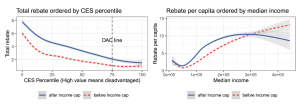
Our research examining equity issues of electric vehicle rebate allocation was published open access in Energy Policy. The paper was coauthored by Shuocheng Guo and Dr. Kontou; Shuocheng completed this research as part of an independent study under Ria’s advisement before completing his MS degree at UIUC! A brief overview and major findings of this research are presented below:
Overview: Incentives such as electric vehicle rebates assist with alleviating high capital costs of alternative fuel cars. We uncover distributional effects of plug-in electric vehicle rebates, focusing on a program in the State of California. We use economic attributes representative of populations of census tracts as well as data on rebates distributed to plug-in electric vehicle buyers through the Clean Vehicle Rebate Project from 2010 to 2018. Horizontal and vertical equity coefficients are computed, while measurement of spatial association characterizes spatial patterns of rebates allocation across the State. We evaluate the distributional fairness of rebates allocation between income groups and disadvantaged communities.
Major findings: We find that rebates have been predominantly given to high income electric vehicle buyers. However, the share of rebates distributed to low-income groups and disadvantaged communities increased over time and after an income-cap policy was put into effect. Spatial analysis shows high spatial clustering effects and rebates concentration in major metropolitan regions. We reveal neighborhood effects: communities with lower median income or disadvantaged receive higher rebate amounts when these are geographic neighbors to clusters characterized as high rebate amount receivers.
By assessing electric vehicles rebate allocation equity, we highlight potential criteria and directions for future policy design. Equitable incentive design could make a difference in the uptake of electric vehicles in disadvantaged and low-income communities!
